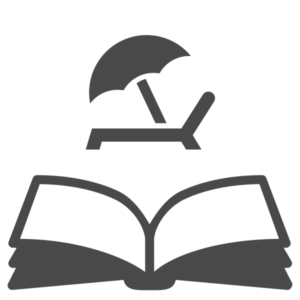Sticky solutions to your everyday business challenges
Question: I’m a manager at a major agricultural company. I was recently chosen to be a part of our company’s mentorship program. My mentor suggested that part of her career success has been to stay up to date on the latest nonfiction books. Since graduating from college and starting in my profession, I haven’t spent much time reading, but I’d like to take my mentor’s advice this summer. Can you recommend any nonfiction books that have been released in the past year that I could download to read during my break?
Answer: Summer and winter breaks are always a good time for emerging and seasoned leaders alike to catch up on the latest subjects. We’ve compiled a list of fresh reads that are compelling without sacrificing complexity. We hope you’ll find something here that will inspire you and add new tools to your leadership toolkit.
1.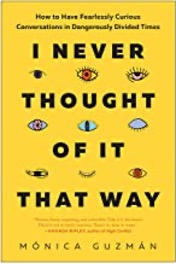 I Never Thought of it That Way―How to Have Fearlessly Curious Conversations in Dangerously Divided Times (March 2022) by Mónica Guzmán
I Never Thought of it That Way―How to Have Fearlessly Curious Conversations in Dangerously Divided Times (March 2022) by Mónica Guzmán
Partisanship is up, trust is down, and our social media feeds make us sure we’re right and everyone else is ignorant (or worse). But avoiding and attacking one another is breaking… everything. When the country could no longer see straight across the political divide, journalist Mónica Guzmán set out to find what was blinding us, and discovered the most eye-opening tool we’re not using: our own curiosity.
In this timely, personal guide, Mónica, the chief storyteller for the national cross-partisan depolarization organization Braver Angels, takes you to the real front lines of a crisis that threatens to grind America to a halt—broken conversations among confounded people. She shows you how to overcome the fear and assumptions that surround us to finally do what only seems impossible: understand and even learn from people in your life whose whole worldview is not just different from yours, but opposed.
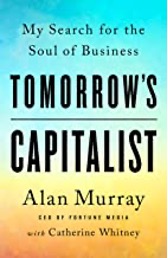 2. Tomorrow’s Capitalist―How My Search for the Soul of Business (May 2022) by CEO of Fortune Media, Alan Murray with Catherine Whitney
2. Tomorrow’s Capitalist―How My Search for the Soul of Business (May 2022) by CEO of Fortune Media, Alan Murray with Catherine Whitney
Tomorrow’s Capitalist reveals how corporate CEOs—the ultimate pragmatists—realized that they could lose their “operating license” unless they tackle the fundamental issues of our time: climate, diversity and inclusion, and inequality and workforce opportunity. Responding to their employees and customers who are demanding corporate change, they have taken the lead in establishing the bold new principles of stakeholder capitalism, ensuring that for the first time in more than a half a century it is not just shareholders who have a say in how corporations are run.
Alan Murray vividly captures the zeitgeist of the real and compelling dynamic that is transforming much of the corporate world.
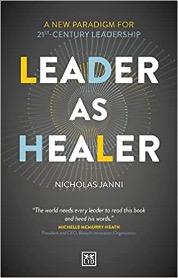 3. Leader as Healer: A New Paradigm for 21st Century Leadership (June 2022) by Nicholas Janni
3. Leader as Healer: A New Paradigm for 21st Century Leadership (June 2022) by Nicholas Janni
Leaders of today must possess potent powers for logic, reason, discernment and strategic forecasting. Yet, they must also be empathic and therefore embodied; grounded and therefore intuitive; present and therefore awake. They must be skilled in mindfulness and deep listening, able to inspire authentic engagement and collaboration, and possess a clear and wholehearted sense of service, mission and purpose – restoring coherence where there is fragmentation and unity where there is division.
Nicholas Janni’s book outlines both a theoretical and practical map towards a new form of leadership, one that embodies the ‘skill, heart, and wisdom’ that the current moment demands. The pathway he describes is one of integration and restoration, which is designed to reawaken the innate human capacities – physical and emotional, individual and transpersonal – that were previously discarded and forgotten during our perilous journey towards profit-maximization and “infinite” economic growth. It offers a way to grow ourselves as leaders and to heal our organizations.
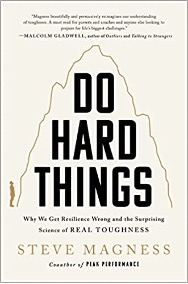 4. Do Hard Things: Why We Get Resilience Wrong and the Surprising Science of Real Toughness (June 2022) by Steve Magness
4. Do Hard Things: Why We Get Resilience Wrong and the Surprising Science of Real Toughness (June 2022) by Steve Magness
Steve Magness, a performance scientist who coaches Olympic athletes, rebuilds our broken model of resilience with one grounded in the latest science and psychology. In Do Hard Things, Magness teaches us how we can work with our body – how experiencing discomfort, leaning in, paying attention, and creating space to take thoughtful action can be the true indications of cultivating inner strength. He offers four core pillars to cultivate such resilience:
- Pillar 1- Ditch the Façade, Embrace Reality
- Pillar 2- Listen to Your Body
- Pillar 3- Respond, Instead of React
- Pillar 4- Transcend Discomfort
Smart and wise all at once, Magness flips the script on what it means to be resilient. Drawing from mindfulness, military case studies, sports psychology, neuroscience, psychology, and philosophy, he provides a roadmap for navigating life’s challenges and achieving high performance that makes us happier, more successful, and, ultimately, better people.
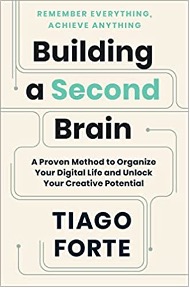 5. Building a Second Brain: A Proven Method to Organize Your Digital Life and Unlock Your Creative Potential (June 2022) by Tiago Forte
5. Building a Second Brain: A Proven Method to Organize Your Digital Life and Unlock Your Creative Potential (June 2022) by Tiago Forte
For the first time in history, we have instantaneous access to the world’s knowledge. There has never been a better time to learn, to contribute, and to improve ourselves. Yet, rather than feeling empowered, we are often left feeling overwhelmed by this constant influx of information. The very knowledge that was supposed to set us free has instead led to the paralyzing stress of believing we’ll never know or remember enough.
Now, this eye-opening and accessible guide shows how you can easily create your own personal system for knowledge management, otherwise known as a Second Brain. As a trusted and organized digital repository of your most valued ideas, notes, and creative work synced across all your devices and platforms, a Second Brain gives you the confidence to tackle your most important projects and ambitious goals.
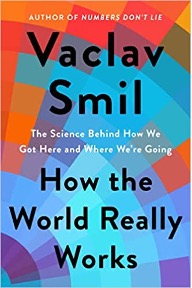 6. How the World Really Works: The Science Behind How We Got Here and Where We’re Going (May 2022) by Vaclav Smil
6. How the World Really Works: The Science Behind How We Got Here and Where We’re Going (May 2022) by Vaclav Smil
We have never had so much information at our fingertips and yet most of us don’t know how the world really works. This book explains seven of the most fundamental realities governing our survival and prosperity. From energy and food production, through our material world and its globalization, to risks, our environment and its future, How the World Really Works offers a much-needed reality check—because before we can tackle problems effectively, we must understand the facts.
In this ambitious and thought-provoking book we see, for example, that globalization isn’t inevitable—the foolishness of allowing 70 percent of the world’s rubber gloves to be made in just one factory became glaringly obvious in 2020—and that our societies have been steadily increasing their dependence on fossil fuels, such that any promises of decarbonization by 2050 are a fairy tale. For example, each greenhouse-grown supermarket-bought tomato has the equivalent of five tablespoons of diesel embedded in its production, and we have no way of producing steel, cement or plastics at required scales without huge carbon emissions.
Ultimately, Smil answers the most profound question of our age: are we irrevocably doomed or is a brighter utopia ahead? Compelling, data-rich and revisionist, this wonderfully broad, interdisciplinary guide finds faults with both extremes. Looking at the world through this quantitative lens reveals hidden truths that change the way we see our past, present and uncertain future.
Question: What new titles are on your reading list this summer?
Do you have a sticky solution question? Send your question to info@executiveexcellence.com.

